Unit 6 I'm watching TV. Section A 1a-2d 课件(共有PPT28张,无音频)
文档属性
| 名称 | Unit 6 I'm watching TV. Section A 1a-2d 课件(共有PPT28张,无音频) | 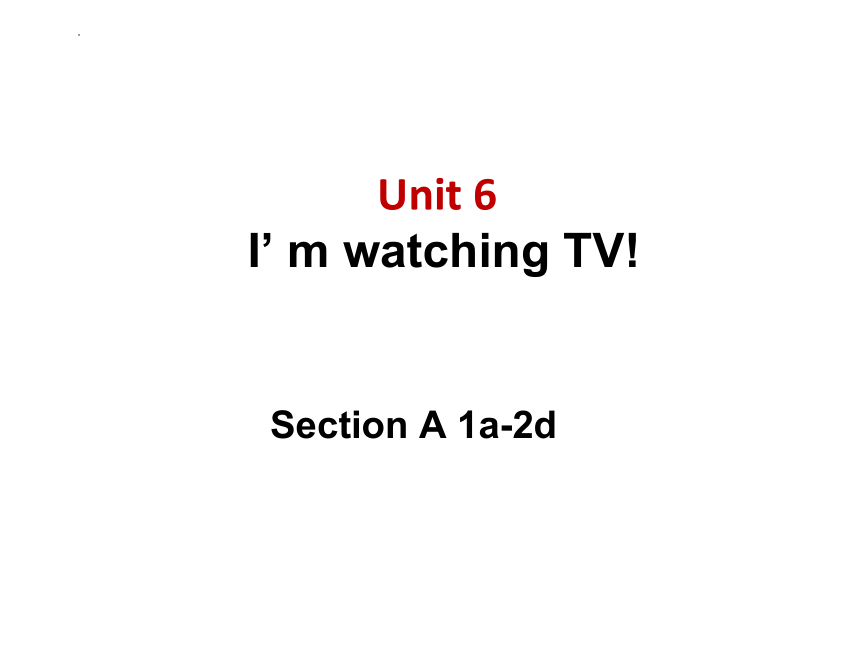 | |
| 格式 | pptx | ||
| 文件大小 | 3.4MB | ||
| 资源类型 | 教案 | ||
| 版本资源 | 人教新目标(Go for it)版 | ||
| 科目 | 英语 | ||
| 更新时间 | 2022-04-29 16:28:06 | ||
图片预览

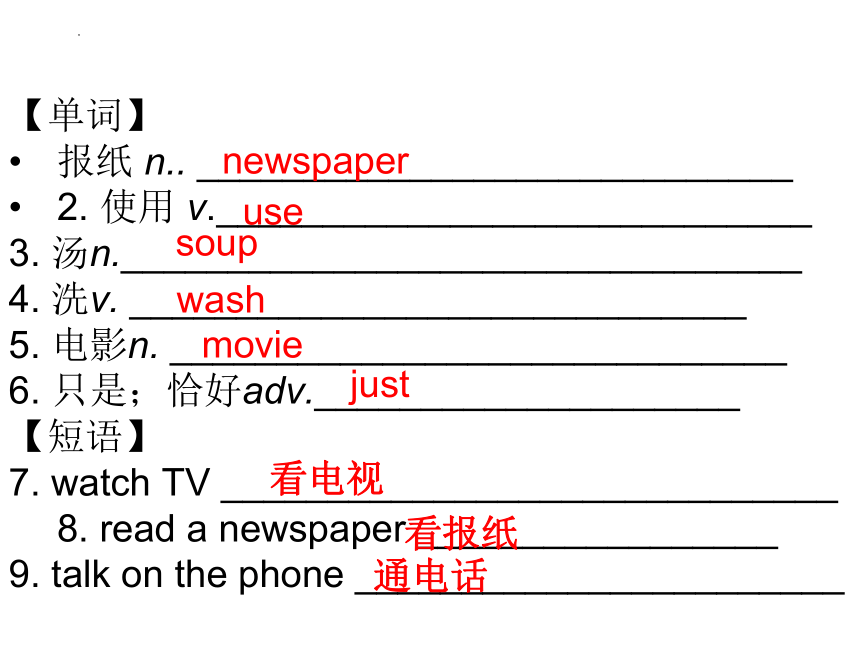
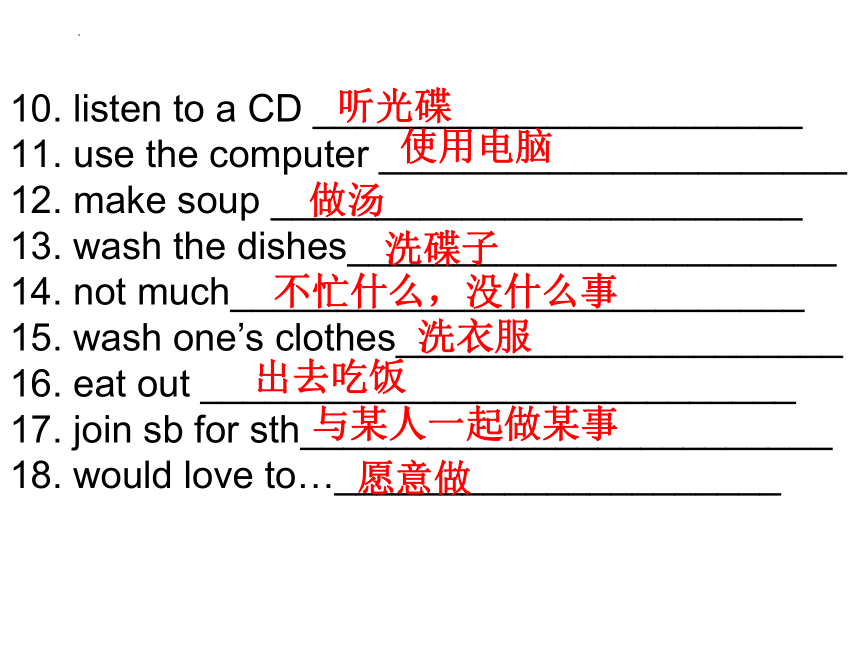
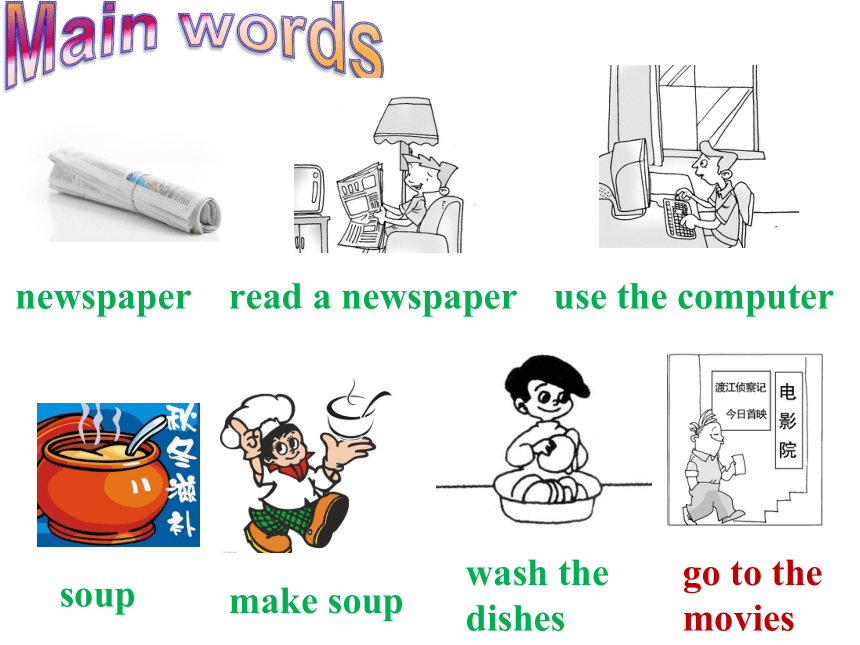
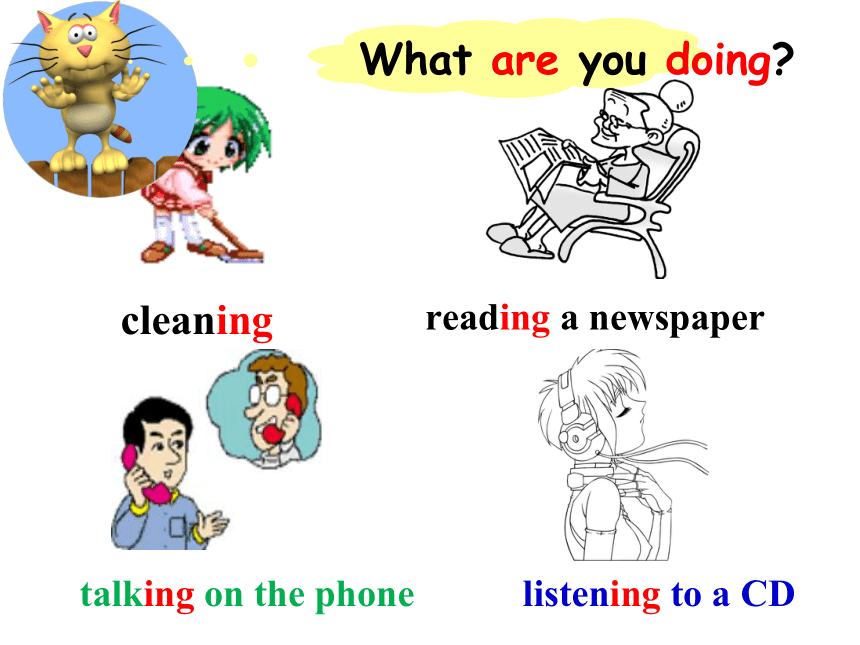
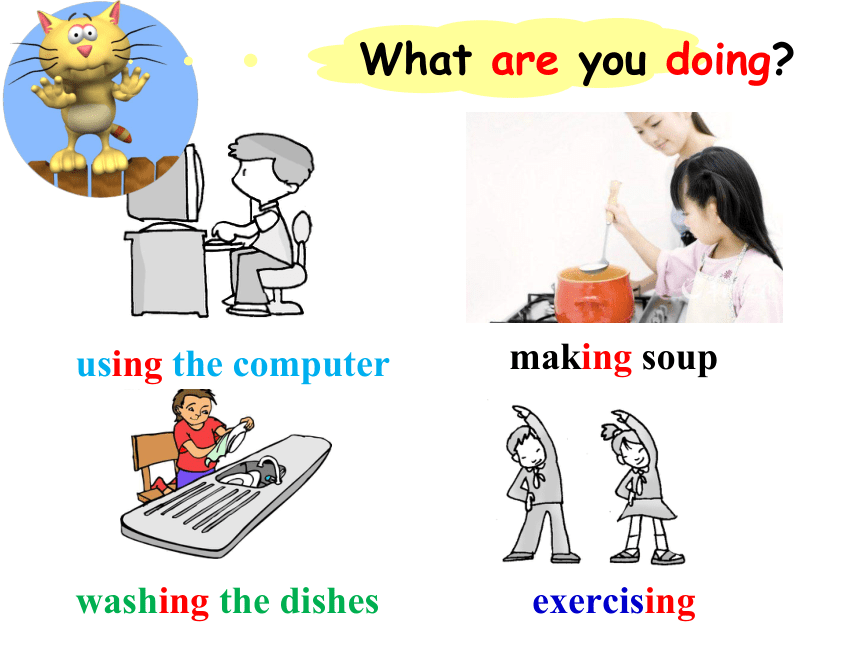
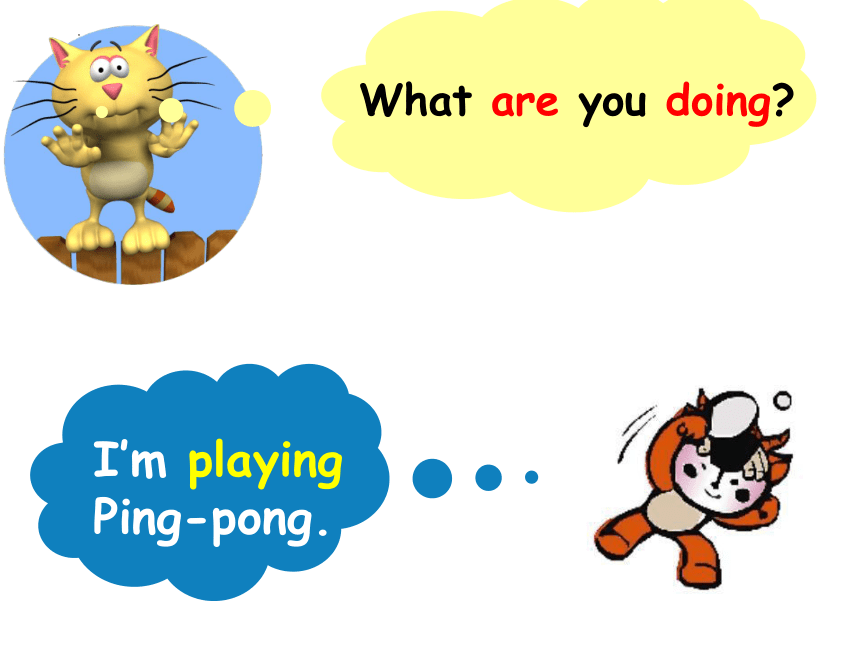

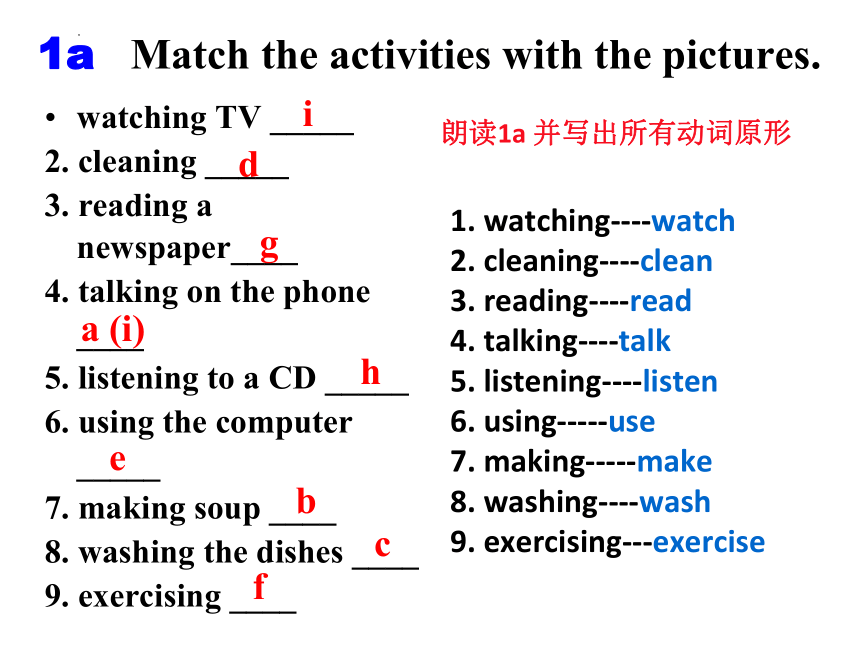
文档简介
(共28张PPT)
Unit 6
I’ m watching TV!
Section A 1a-2d
【单词】
报纸 n.. ____________________________
2. 使用 v.____________________________
3. 汤n.________________________________
4. 洗v. _____________________________
5. 电影n. _____________________________
6. 只是;恰好adv.____________________
【短语】
7. watch TV _____________________________ 8. read a newspaper _________________
9. talk on the phone _______________________
newspaper
use
soup
wash
movie
just
看电视
看报纸
通电话
10. listen to a CD _______________________
11. use the computer ______________________
12. make soup _________________________
13. wash the dishes_______________________ 14. not much___________________________
15. wash one’s clothes_____________________ 16. eat out ____________________________
17. join sb for sth_________________________ 18. would love to…_____________________
听光碟
使用电脑
做汤
洗碟子
不忙什么,没什么事
洗衣服
出去吃饭
与某人一起做某事
愿意做
use the computer
read a newspaper
newspaper
make soup
soup
wash the dishes
go to the movies
cleaning
listening to a CD
reading a newspaper
talking on the phone
What are you doing
exercising
making soup
washing the dishes
using the computer
What are you doing
What are you doing
I’m playing
Ping-pong.
1a Match the activities with the pictures.
1. watching TV __
2. cleaning __
3. reading a newspaper __
4. talking on the phone __
5. listening to a CD __
6. using the computer __
7. making soup ___
8. washing the dishes __
9. exercising ___
a
g
d
i
h
e
c
b
f
1a Match the activities with the pictures.
watching TV _____
2. cleaning _____
3. reading a newspaper____
4. talking on the phone ____
5. listening to a CD _____
6. using the computer _____
7. making soup ____
8. washing the dishes ____
9. exercising ____
i
d
g
a (i)
h
e
b
c
f
朗读1a 并写出所有动词原形
1. watching----watch
2. cleaning----clean
3. reading----read
4. talking----talk
5. listening----listen
6. using-----use
7. making-----make
8. washing----wash
9. exercising---exercise
1b Listen. What are these people doing
Write the numbers from 1a.
a. Jenny ____ b. John _____
c. Dave and Mary ____
1
8
5
Ask and answer : ⑴ What’s Jenny doing
⑵ What’s John doing
⑶ What are Dave and Mary doing
1c Ask and answer questions about what people are doing in 1a.(Do it like this!)
A: What’s he doing in picture E
B: He’s using the computer.
A: What are they doing in picture H
B: They’re listening to a CD.
1. What is Steve
doing
2. What is Jack
doing
a. He is watching TV.
b. He is listening to a
CD.
2a Listen and match the answers
with the questions.
ListeningListening
Jack: Hello, Steve.
Steve: Hi, Jack.
Jack: What _____ you ______, Steve
Steve: I’m ___________. What about you
Jack: I’m _______________, but it’s kind of
_______.
Steve: Yeah, my TV show is also not very
__________. Do you want to _____ the movies
Jack: That sounds good.
are doing
watching TV
listening to a CD
2b Listen again. Fill in the blanks.
boring
interesting
go to
Jack: Hello, Steve.
Steve: Hi, Jack.
Jack: What are you doing, Steve
Steve: I’m watching TV. What about you
Jack: I’m listening to a CD, but it’s kind of
boring.
Steve: Yeah, my TV show is also not very
interesting. Do you want to go to the movies
Jack: That sounds good.
Notice the stressed syllables. 重读音节
2b
2c
Role-play.
Laura and Jenny are __________________. Laura is _________________, and Jenny
_____________. Jenny’s parents aren’t _________. So she asks Laura to join her __________, and they can ________. They will meet at Jenny’s home _____________.
Listen and fill in the blanks according to the conversation.
washing her clothes
for dinner
at home
eat out
at half past six
2d
talking on the phone
is watching TV
Group WorkGroup Work
Work in groups of four and describe (描述) the things they are doing.
playground 操场
Language pointsLanguage points
1. Not much是用做回答的交际套语,还可说成 Nothing much, 相当于汉语“不忙什么;没什么事”,表示自己有空。例如:
A:What are you doing this evening
你今晚要做什么事?
B:Well, nothing much.
嗯,没什么事。
2. join somebody for something 表示“与某人一起做某事;参与或加入到某人的行列中一起做某事”。例如:
Would you come and join us for a cup of coffee We need to talk to you.
你来跟我们喝杯咖啡好吗? 我们要跟你谈一谈。
join / join in 的区别
例如:
He joined the League in 1985.
他在1985年入团。
I hope you’ll all join in the discussion.
我希望你们大家都参加讨论。
join 指加入某党派、某组织或某社会团体,以及参军等,还可表示参与某种活动。
例句:
I will never forget the day when I joined the Party.
我永远也忘不了入党的那一天。
join in 通常指参加某种活动,尤其指和其他人一起参加某项活动。例句:
May I join in the game
我可以参加这个比赛吗?
3. I’d love to.
我很乐意。
1) 作为一个交际应答套语,I’d love to 经常用于礼貌地接受他人邀请,还可说成I’d like to, 但语气较前者稍弱。例如:
A:Would you like to come with us to the show
你愿意跟我们一起去看表演吗?
B:Thanks. I’d like to.
多谢了,我可以的。
2) 当婉言拒绝他人邀请时,英语多用I’d love to, but … 或Sorry, I’m afraid I can’t because …等。例如:
A:I’m going to town. Would you like to join me
我进城去,你想跟我一同去吗?
B:Sorry, I’m afraid I can’t because I still have lots of homework to do.
真抱歉,恐怕我去不成,我还有好多作业要做。
一、根据中文意思或首字母提示,用单词的适当形式填空,每空一词。
1. My father is reading a n _________ in the sitting room.
2. Tom often ____________ (使用) the phone to play games.
3. Sally likes _________(电影) a lot. So she goes to see it every Saturday.
4. --How was your weekend
--__________(只是;恰好) so-so.
5. --Would you like another bowl of rice --No, thanks. But I’d like some __________(汤).
课 堂 小 测
ewspaper
uses
movies
Just
soup
二、单项选择
( ) 1. Ken usually _________chess on weekends. And now he’s ___________ TV.
A. playing; watching B. plays; watches
C. plays; watching D. playing; watches
( ) 2. –Where is your sister –She’s ___________ with father over there.
A. thinks B. thinking C. talked D. talking
( ) 3. Look! Mom is ___________ in the kitchen.
A. cooking B. cook C. cooks D. cooked
C
D
A
( ) 4. I don’t want to eat at home. Let’s _____________.
A. do homework B. watch TV
C. play chess D. eat out
( ) 5. -Do you want to go to the beach with me - ___________, but you have to wait for me.
A. I’d love to B. No, thank you
C. Yes, please D. No, I don’t want.
D
A
三、翻译句子
1. --你在做什么? --没什么。我正在煮汤。
_______________________________________ _______________________________________ 2. --他们正在用电脑吗? --不, 他们在听CD. _______________________________________
_______________________________________3.我堂弟正在讲电话。
_______________________________________4. 那听起来不错,到时见啊。
_______________________________________
—What are you doing
—Not much.I’m making soup.
—Are they using the computer
—No,they’re listening to a CD.
My cousin is talking on the phone.
That sounds good,see you then.
5. --你想与我们一起吃午餐吗?--好啊,我乐意去。
______________________________________________________________________________
—Do you want to join us for lunch
—Yes,I’d love to.
Written: Finish Exercise 1 on Book 1.
Oral: Practice the conversation in 2b with your partner and prepare for the presentation.
HomeworkHomework
Unit 6
I’ m watching TV!
Section A 1a-2d
【单词】
报纸 n.. ____________________________
2. 使用 v.____________________________
3. 汤n.________________________________
4. 洗v. _____________________________
5. 电影n. _____________________________
6. 只是;恰好adv.____________________
【短语】
7. watch TV _____________________________ 8. read a newspaper _________________
9. talk on the phone _______________________
newspaper
use
soup
wash
movie
just
看电视
看报纸
通电话
10. listen to a CD _______________________
11. use the computer ______________________
12. make soup _________________________
13. wash the dishes_______________________ 14. not much___________________________
15. wash one’s clothes_____________________ 16. eat out ____________________________
17. join sb for sth_________________________ 18. would love to…_____________________
听光碟
使用电脑
做汤
洗碟子
不忙什么,没什么事
洗衣服
出去吃饭
与某人一起做某事
愿意做
use the computer
read a newspaper
newspaper
make soup
soup
wash the dishes
go to the movies
cleaning
listening to a CD
reading a newspaper
talking on the phone
What are you doing
exercising
making soup
washing the dishes
using the computer
What are you doing
What are you doing
I’m playing
Ping-pong.
1a Match the activities with the pictures.
1. watching TV __
2. cleaning __
3. reading a newspaper __
4. talking on the phone __
5. listening to a CD __
6. using the computer __
7. making soup ___
8. washing the dishes __
9. exercising ___
a
g
d
i
h
e
c
b
f
1a Match the activities with the pictures.
watching TV _____
2. cleaning _____
3. reading a newspaper____
4. talking on the phone ____
5. listening to a CD _____
6. using the computer _____
7. making soup ____
8. washing the dishes ____
9. exercising ____
i
d
g
a (i)
h
e
b
c
f
朗读1a 并写出所有动词原形
1. watching----watch
2. cleaning----clean
3. reading----read
4. talking----talk
5. listening----listen
6. using-----use
7. making-----make
8. washing----wash
9. exercising---exercise
1b Listen. What are these people doing
Write the numbers from 1a.
a. Jenny ____ b. John _____
c. Dave and Mary ____
1
8
5
Ask and answer : ⑴ What’s Jenny doing
⑵ What’s John doing
⑶ What are Dave and Mary doing
1c Ask and answer questions about what people are doing in 1a.(Do it like this!)
A: What’s he doing in picture E
B: He’s using the computer.
A: What are they doing in picture H
B: They’re listening to a CD.
1. What is Steve
doing
2. What is Jack
doing
a. He is watching TV.
b. He is listening to a
CD.
2a Listen and match the answers
with the questions.
ListeningListening
Jack: Hello, Steve.
Steve: Hi, Jack.
Jack: What _____ you ______, Steve
Steve: I’m ___________. What about you
Jack: I’m _______________, but it’s kind of
_______.
Steve: Yeah, my TV show is also not very
__________. Do you want to _____ the movies
Jack: That sounds good.
are doing
watching TV
listening to a CD
2b Listen again. Fill in the blanks.
boring
interesting
go to
Jack: Hello, Steve.
Steve: Hi, Jack.
Jack: What are you doing, Steve
Steve: I’m watching TV. What about you
Jack: I’m listening to a CD, but it’s kind of
boring.
Steve: Yeah, my TV show is also not very
interesting. Do you want to go to the movies
Jack: That sounds good.
Notice the stressed syllables. 重读音节
2b
2c
Role-play.
Laura and Jenny are __________________. Laura is _________________, and Jenny
_____________. Jenny’s parents aren’t _________. So she asks Laura to join her __________, and they can ________. They will meet at Jenny’s home _____________.
Listen and fill in the blanks according to the conversation.
washing her clothes
for dinner
at home
eat out
at half past six
2d
talking on the phone
is watching TV
Group WorkGroup Work
Work in groups of four and describe (描述) the things they are doing.
playground 操场
Language pointsLanguage points
1. Not much是用做回答的交际套语,还可说成 Nothing much, 相当于汉语“不忙什么;没什么事”,表示自己有空。例如:
A:What are you doing this evening
你今晚要做什么事?
B:Well, nothing much.
嗯,没什么事。
2. join somebody for something 表示“与某人一起做某事;参与或加入到某人的行列中一起做某事”。例如:
Would you come and join us for a cup of coffee We need to talk to you.
你来跟我们喝杯咖啡好吗? 我们要跟你谈一谈。
join / join in 的区别
例如:
He joined the League in 1985.
他在1985年入团。
I hope you’ll all join in the discussion.
我希望你们大家都参加讨论。
join 指加入某党派、某组织或某社会团体,以及参军等,还可表示参与某种活动。
例句:
I will never forget the day when I joined the Party.
我永远也忘不了入党的那一天。
join in 通常指参加某种活动,尤其指和其他人一起参加某项活动。例句:
May I join in the game
我可以参加这个比赛吗?
3. I’d love to.
我很乐意。
1) 作为一个交际应答套语,I’d love to 经常用于礼貌地接受他人邀请,还可说成I’d like to, 但语气较前者稍弱。例如:
A:Would you like to come with us to the show
你愿意跟我们一起去看表演吗?
B:Thanks. I’d like to.
多谢了,我可以的。
2) 当婉言拒绝他人邀请时,英语多用I’d love to, but … 或Sorry, I’m afraid I can’t because …等。例如:
A:I’m going to town. Would you like to join me
我进城去,你想跟我一同去吗?
B:Sorry, I’m afraid I can’t because I still have lots of homework to do.
真抱歉,恐怕我去不成,我还有好多作业要做。
一、根据中文意思或首字母提示,用单词的适当形式填空,每空一词。
1. My father is reading a n _________ in the sitting room.
2. Tom often ____________ (使用) the phone to play games.
3. Sally likes _________(电影) a lot. So she goes to see it every Saturday.
4. --How was your weekend
--__________(只是;恰好) so-so.
5. --Would you like another bowl of rice --No, thanks. But I’d like some __________(汤).
课 堂 小 测
ewspaper
uses
movies
Just
soup
二、单项选择
( ) 1. Ken usually _________chess on weekends. And now he’s ___________ TV.
A. playing; watching B. plays; watches
C. plays; watching D. playing; watches
( ) 2. –Where is your sister –She’s ___________ with father over there.
A. thinks B. thinking C. talked D. talking
( ) 3. Look! Mom is ___________ in the kitchen.
A. cooking B. cook C. cooks D. cooked
C
D
A
( ) 4. I don’t want to eat at home. Let’s _____________.
A. do homework B. watch TV
C. play chess D. eat out
( ) 5. -Do you want to go to the beach with me - ___________, but you have to wait for me.
A. I’d love to B. No, thank you
C. Yes, please D. No, I don’t want.
D
A
三、翻译句子
1. --你在做什么? --没什么。我正在煮汤。
_______________________________________ _______________________________________ 2. --他们正在用电脑吗? --不, 他们在听CD. _______________________________________
_______________________________________3.我堂弟正在讲电话。
_______________________________________4. 那听起来不错,到时见啊。
_______________________________________
—What are you doing
—Not much.I’m making soup.
—Are they using the computer
—No,they’re listening to a CD.
My cousin is talking on the phone.
That sounds good,see you then.
5. --你想与我们一起吃午餐吗?--好啊,我乐意去。
______________________________________________________________________________
—Do you want to join us for lunch
—Yes,I’d love to.
Written: Finish Exercise 1 on Book 1.
Oral: Practice the conversation in 2b with your partner and prepare for the presentation.
HomeworkHomework
同课章节目录
- Unit 1 Can you play the guitar?
- Section A
- Section B
- Unit 2 What time do you go to school?
- Section A
- Section B
- Unit 3 How do you get to school?
- Section A
- Section B
- Unit 4 Don't eat in class.
- Section A
- Section B
- Unit 5 Why do you like pandas?
- Section A
- Section B
- Unit 6 I'm watching TV.
- Section A
- Section B
- Review of Units 1-6
- Unit 7 It's raining!
- Section A
- Section B
- Unit 8 Is there a post office near here?
- Section A
- Section B
- Unit 9 What does he look like?
- Section A
- Section B
- Unit 10 I'd like some noodles.
- Section A
- Section B
- Unit 11 How was your school trip?
- Section A
- Section B
- Unit 12 What did you do last weekend?
- Section A
- Section B
